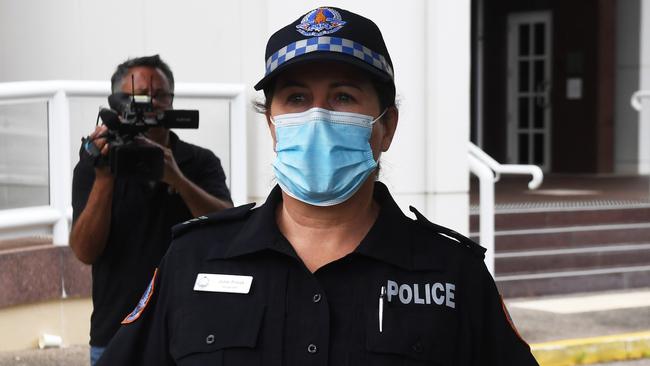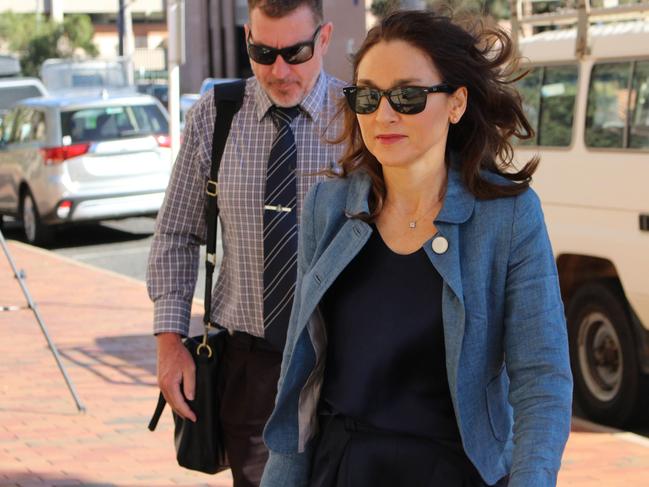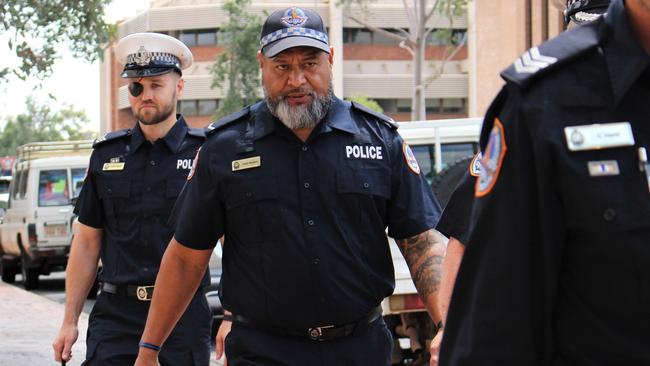Kumanjayi Walker inquest: Yuendumu sergeant Julie Frost apologises to community, rejects ‘self-serving propaganda’
The head police officer in Yuendumu on the night of Kumanjayi Walker's death has made an apology to the community. Read what she said and why.
Police & Courts
Don't miss out on the headlines from Police & Courts. Followed categories will be added to My News.
The officer in charge at the Yuendumu police station the night Kumanjayi Walker died has apologised to the community for the sense of “betrayal” they felt at not being told the teenager had passed away.
Sergeant Julie Frost took the stand in the Alice Springs Local Court on Wednesday at an ongoing inquest into Mr Walker’s death, after the 19-year-old Warlpiri man was fatally shot by Constable Zach Rolfe in November 2019.
Constable Rolfe was acquitted on all charges in relation to the shooting by a Supreme Court jury in March.
Sergeant Frost said she would never have allowed Constable Rolfe’s Immediate Response Team into the community that night, had she been aware of racist text messages between him and other members of the IRT that emerged at the inquest last week.

But she conceded she did not consider allowing family members inside the police station to comfort the dying teenager after the shooting, saying she wasn’t aware they were waiting outside at the time.
“I was concerned that there may be some hostility towards my members and that may lead to safety concerns for my members and the family, and it was a decision that we had to make on that night based on safety,” she said.
“But I totally understand the anger and pain that they are feeling and it’s something that it’s very hard to come to terms with, that we had to make those decisions.
“I understand their anger, I totally understand and I really want to apologise to the community.”
Counsel assisting the Coroner, Peggy Dwyer, said body-worn camera footage showed one of Mr Walker’s relatives claiming Sergeant Frost had told her she was going to get a task force in to “hunt him down like a dog”.

But Sergeant Frost denied saying any such thing in the days after Mr Walker had rushed at police armed with an axe and apologised if her words were misconstrued.
“I said to Lottie (Robertson) on the Thursday night ‘Look, if he doesn’t hand himself in within two hours, I’m going to have to get Alice Springs police out and they’ll go in a lot harder than what the community members would,” she said
“I know that doesn’t sound great, but it was my way of appealing to Eddie and Lottie (Robertson) that this was very serious and … a plea to get them to bring Kumanjayi in.”
Sergeant Frost has been the target of commentary in the media by Constable Rolfe’s father, Richard Rolfe, previously described by NT Police barrister, Ian Freckelton KC, as “inflammatory and, for the most part, utterly inaccurate”.
On Wednesday, Dr Dwyer asked her to respond to some of those allegations, including that she denied a request from the IRT members for assistance from local police, lied in previous court appearances and should be charged with an offence for neglecting to perform first aid.
Sergeant Frost told the court she only had minimal involvement in performing first aid as Constable Rolfe and the rest of the IRT team “were doing a really, really good job”.
“I knew the members that were performing CPR had a military background and what they were doing, they were doing a fantastic job, as good as you could do with the equipment we had,” she said.
“That allowed me to continue planning resources, ensuring the safety of (police).
Dr Dwyer asked Sergeant Frost if she had a response to a suggestion by Richard Rolfe in comments published online that it was her “complete dereliction of duty that’s responsible for the death of Kumanjayi” but she said she would “probably rather not say”.
“The shooting incident itself was incredibly difficult and it’s very hard to sort of come to terms with what happened that weekend,” she said.
“To have the social media stuff propagated by Richard Rolfe and his friends and family has been nothing short of devastating to me and has had a lot of reputational damage.
“The stuff that has been reported is factually incorrect, it’s biased, it’s self-serving, nothing but self-serving propaganda.”
On Tuesday, Constable Felix Alefaio, a Yuendumu police officer with more than a decade of experience dealing with violent gangs in New Zealand – where police do not routinely carry guns – told the court he would still opt to go armed in the NT if given the choice.
Under questioning by Parumpurru Committee of Yuendumu Community lawyer Julian McMahon, Constable Alefaio said he had not carried a gun on his belt in more than 11 years as a Kiwi police officer.

Constable Alefaio agreed this was despite coming into contact with “very violent” and “formidable and pretty tough” gangs, with ready access to firearms of their own, during his time in uniform.
Mr McMahon asked Constable Alefaio whether he would have been comfortable doing his job in Yuendumu without his Glock as part of his kit, and the officer said while he didn’t “think it would make a difference”, it also “depends on the circumstances”.
“From experience, back in Yuendumu, I come across some incidents where I’m off duty and I (am) approached by people that’s been assaulted, and sometimes the perpetrator is also present,” he said.
“We were all able to defuse the issues without us having our police equipment on us, so we just managed to just verbally calm them down and talk them out of what’s been happening.
“(But) if I’m unarmed, or off duty, and I come across a situation where weapons are involved, I’ll probably stay out of that situation.”
Constable Alefaio said while he did not believe he currently had a choice about whether to carry a gun or not, “if command allowed us not to carry guns then I would comply with that”.
But when asked directly by NT Police barrister, Ian Freckelton KC, Constable Alefaio said trouble could “erupt quickly” in Yuendumu and if given the choice, “I’d probably put on my firearm”.
The inquest continues on Friday.





